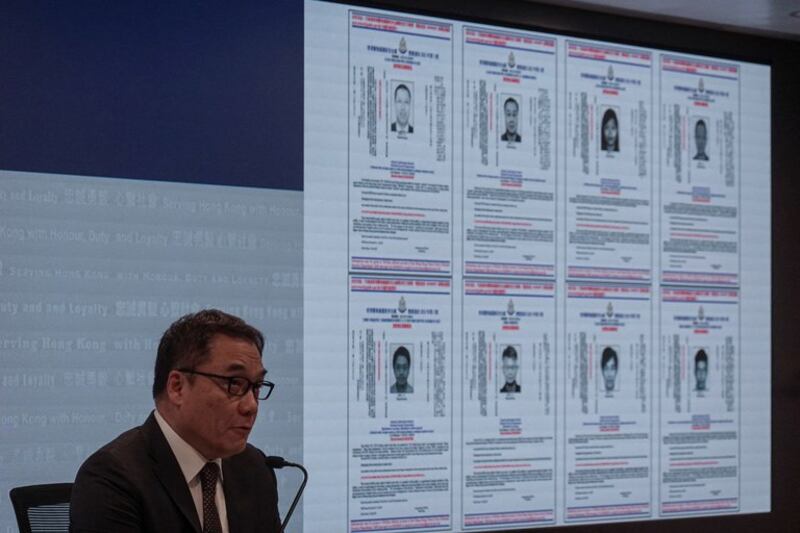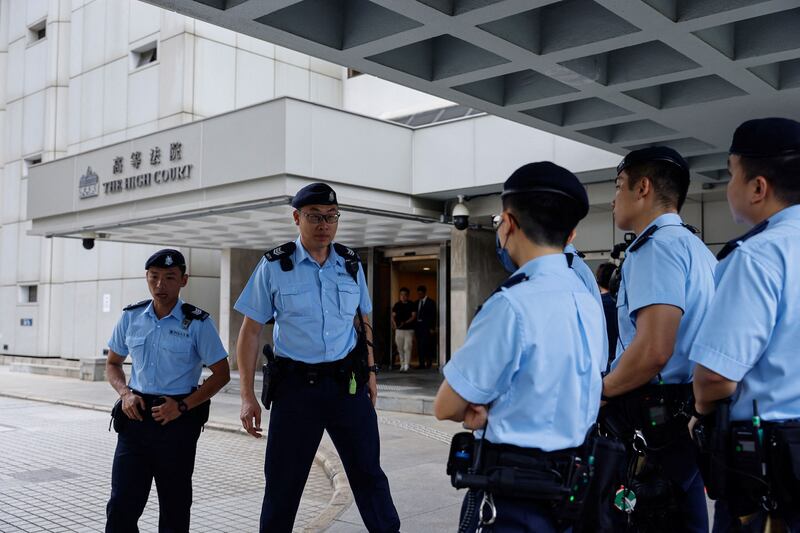China on Friday demanded the United States invite Hong Kong leader John Lee to attend the Asia Pacific Economic Cooperation forum in November amid media reports that Washington has barred him from entering the country, amid an ongoing crackdown on dissent in his city under the national security law.
"The APEC host country has a responsibility and obligation to allow all member representatives to attend the meeting smoothly," foreign ministry spokeswoman Mao Ning told a regular news briefing in Beijing.
"The U.S.' illegal and unreasonable sanctions on Chinese personnel, including Chief Executive John Lee, is an act of bullying that seriously violates the basic norms of international relations," she said.
Lee was placed under U.S. sanctions in 2020 as a "person involved in the erosion of the obligations of China" under the terms of the 1997 handover of Hong Kong to Chinese rule, in which the city was promised the continuation of its traditional freedoms for at least 50 years.

Calls have been growing among activists and rights groups for Lee to be barred from U.S. soil after Hong Kong's national security police this month placed bounties on the heads of eight prominent democracy activists in exile, two of whom are based in the United States.
Mao said China expressed "strong dissatisfaction and firm opposition" to the sanctions.
"We urge the U.S. to immediately correct its wrongdoing, lift the sanctions on Chief Executive John Lee ... and invite [him] to attend the meeting as usual," Mao said.
Violent police crackdown
The Hong Kong government made a very similar statement citing the rules of APEC.
The Washington Post quoted unidentified U.S. officials on Friday as saying that Lee would be barred from the Asia-Pacific Economic Cooperation meeting in San Francisco under sanctions imposed on him in 2020, after he oversaw a violent police crackdown on the 2019 protest movement before being promoted to chief executive.
London-based rights group Hong Kong Watch, which co-signed an open letter to President Joe Biden on the matter, welcomed the decision not to allow Lee to attend the APEC summit.
"This decision is in line with stated U.S. policy that officials who are sanctioned, have poor human rights records, or have not been democratically elected are not invited to summits," the group's policy director Sam Goodman said in a statement. "John Lee meets the criteria for all three of these areas."
"Given that the Hong Kong Government is no longer autonomous as a result of the National Security Law, the US and likeminded countries should consider whether it deserves a seat at future bilateral and multilateral summits and negotiations," he said.

The decision comes as more than 45% of Japanese businesses in Hong Kong cited the national security law as a key reason for falling investor confidence in the city.
A joint survey of business confidence by Japan's Consulate-General, the Japan Economic and Trade Office and the Hong Kong Japanese Chamber of Commerce & Industry for the first half of the year found that 45.2% of respondents were "very concerned" or "concerned" about the law, compared with 40.7% compared with the same period last year.
More than 16% said it had had a "negative impact on business," while nearly 70% said the ongoing exodus of qualified people made it "difficult to secure excellent human resources," the survey said.
More than half cited the "weakening of Hong Kong's autonomy" due to Chinese government intervention, it said.
Rising risk
Overall, the law was associated with the "resignation of local employees due to emigration," "increased business risk" and a "decline in Hong Kong's reputation."
A Japanese journalist based in Hong Kong who gave only the nickname Atom said Japanese companies once viewed Hong Kong as the ideal place from which to enter the Chinese market, as business there was also profitable.
"I think the reason Japanese-invested companies set up branches in Hong Kong was to get information about China ... but the most worrying thing right now is that that information isn't available," Atom said. "They are also worried that their employees could get arrested in Hong Kong."
"I've started noticing when interviewing people in Hong Kong that there are certain topics you can't talk about," he said. "There are some messages that it's not safe to send on your phone."
"These are things that used to happen [only] in mainland China, but now I'm having such fears in Hong Kong -- mainland China and Hong Kong are becoming more and more similar," he said.
In May, Sebastien Lai, son of jailed pro-democracy media mogul Jimmy Lai, warned that Hong Kong is now a risky place to do business due to the suppression of promised freedoms under Chinese rule.
Translated by Luisetta Mudie .
